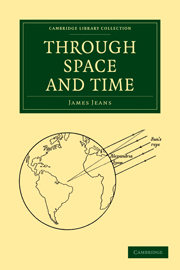Summary
There are nine planets circling round the sun, of which of course the earth is one. Of the other eight, five have been known from pre-historic times, while the remaining three—the three farthest from the sun—are comparatively recent discoveries.
The row of models exhibited in fig. 60 shew how greatly these nine planets differ in size. Those which are nearest to, and farthest away from, the sun are the smallest, while the middle members, Jupiter and Saturn, are the largest. Jupiter, the central member, is largest of all, with a diameter of nearly 90,000 miles, and a volume 1300 times that of the earth. Jupiter stands in the same proportion to the earth as a football to a marble, while on the same scale Mars would be hardly larger than a pea.
If we wish to complete our model by placing the objects shewn in fig. 60 at their proper distances, the nearest planet, Mercury, must describe an orbit which is not quite circular, but is such that, even at its nearest approach to the sun, the planet would be 20 feet away. The earth must keep at a distance of 50 feet from the sun, while Pluto, the farthest planet of all, must describe an orbit nearly half a mile in radius.
We see that the solar system consists mainly of empty space, and yet the emptiness of the solar system is as nothing compared to the emptiness of space itself.
- Type
- Chapter
- Information
- Through Space and Time , pp. 124 - 155Publisher: Cambridge University PressPrint publication year: 2009First published in: 1934

